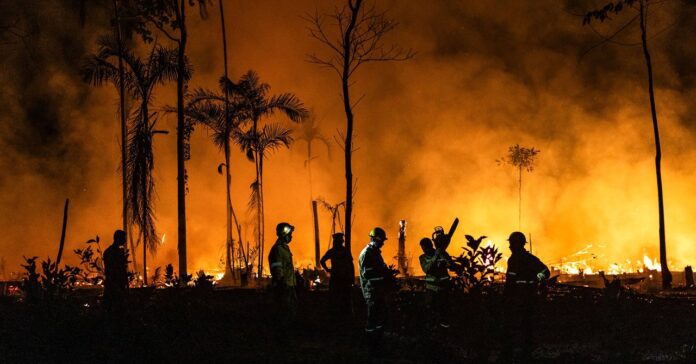“Degradation signifies that you continue to have status wooded area, however you’re shedding probably the most construction, probably the most functioning,” says Armenteras Pascual. “You could even glance and suppose it’s in reality a ravishing wooded area, however it’s no longer so wholesome.”
Being degraded additionally makes a wooded area extra vulnerable to wildfire. And as soon as part of the Amazon burns, it’s much more likely to catch hearth once more. “When a wooded area burns, bushes die, freeing natural topic above the soil and opening the cover,” says Flores. “Therefore, extra gasoline is to be had and extra daylight and wind can desiccate this gasoline, inflicting the ecosystem to turn into extra flammable. The result is that burnt forests are a lot more more likely to burn once more.”
When taking into consideration the affects of human disturbance and excessive drought over contemporary a long time, up to 38 % of what stays of the Amazon Rainforest would possibly already be degraded, Flores and his colleagues discovered.
Via taking into consideration the entire elements contributing to the degradation of the Amazon—local weather alternate, drought, deforestation, wildfires—the workforce additionally evolved fashions projecting warmth, degradation, and hearth developments into the longer term. The findings are gloomy. Via 2050, their fashions display, temperatures over the Amazon Basin are anticipated to be 2 to 4 levels Celsius hotter than they’re lately, relying on greenhouse gasoline emissions over the following two and a part a long time. Via 2050, the Amazon’s dry season could also be a month longer than it’s now. Wildfires are anticipated to extend in frequency and severity.
In consequence, they estimate just about part the Amazon would possibly achieve a “tipping level” via 2050, when it’s going to stop being a wooded area in any respect and transition into savannah and grassland.
The affects of this may be devastating on native and international ranges. A 2021 record from the Science Panel for the Amazon discovered that 10,000 of the rainforest’s plant and animal species are liable to extinction because of local weather alternate and habitat destruction. A common cave in like this may increasingly smartly push those species over the threshold. Lots of the Amazon’s 40 million human population could also be displaced via insufferable warmth, and Indigenous peoples particularly would lose their livelihoods, tactics of existence, and data methods.
As alarmist as this may sound, Armenteras Pascual thinks the warnings of Flores and his colleagues are, if the rest, understated. “It’s no longer like part of the Amazon will cave in and the opposite part will cross on simply fantastic,” she says. “The entire device may cave in—the entire device with regards to hydrology, which is one of the most vital function of the Amazon globally, its function in cooling the local weather.”
If the Amazon have been to go through a “large-scale cave in” via 2050, as Flores and his colleagues warn, it’ll emit up to 120 billion heaps of carbon dioxide into the ambience, recently similar to about 3.5 years of worldwide CO2 emissions. World temperatures would possibly upward push 0.3 levels Celsius in consequence.
For now, the strangely top collection of fires are anticipated to proceed burning in the course of the month of April, when the wet season starts. “It’s hearth season,” Armenteras Pascual, who is operating with the Colombian govt to observe emissions from fires within the Northern Amazon, says. “Simply this previous week we had 7,000 hectares burning that no person is speaking about, in one of the crucial nature preserves that we have got close to the border with Venezuela.”
“There are some fires right here in Colombia as smartly,” she provides. Knowledge from the satellites presentations that simply over 1,000 fires burned within the Colombian Amazon within the first week of March. “Fires are burning,” Armenteras Pascual says, “they usually’re selecting up.”





 #shorts #shortsfeed #nature #youtubeshorts #iciness
#shorts #shortsfeed #nature #youtubeshorts #iciness